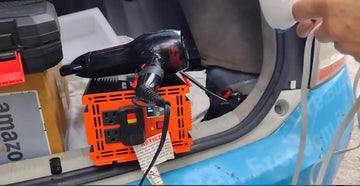As one of the core components of a van, the battery's performance is directly related to the normal starting and driving of the vehicle and the operation of various on-board equipment. A suitable battery can not only ensure driving safety, but also significantly improve the overall performance of the vehicle. However, there are many types of batteries on the market with different characteristics. How to choose the battery that is most suitable for their van has become a problem faced by many car owners. This article aims to provide readers with a detailed guide to help them choose the most suitable truck battery based on their specific needs.
Table of contents:
- Learn about the different types of van batteries
- How to choose a van battery type
- Determine Your Needs
- Key factors in choosing a battery for a van
- Buy the best lithium battery for your van
- When does your van need a battery replacement
- How to maximize the service life and efficiency of van lithium batteries
- in conclusion
- FAQs
Learn about the different types of van batteries
Lead acid battery
Lead-acid batteries are one of the most common battery types and work by producing electricity through a chemical reaction. The advantages are mature technology and low cost; the disadvantages are heavy weight, cumbersome maintenance, and relatively short lifespan. Lead-acid batteries are widely used in various vehicles, especially as starting batteries.
Lithium battery
Lithium batteries are known for their high energy density, long life and low self-discharge rate. With the advancement of technology, the cost of lithium batteries has gradually decreased, and their safety has also been significantly improved. Lithium batteries are ideal for trucks that need to be powered for long periods of time or carry a lot of onboard equipment. However, lithium batteries are still more expensive than lead-acid batteries and require specialized charging and management systems.
AGM battery
AGM batteries are an improved version of lead-acid batteries that use absorbent fiberglass separators to prevent electrolyte leakage. This type of battery has the characteristics of low maintenance requirements, strong deep cycle capability, and resistance to vibration, making it ideal for trucks that require frequent starts and stops or long periods of discharge.
How to choose a van battery type
If the van is mainly used for daily commuting or short-distance transportation, and the battery performance requirements are not high, you can choose a lower-cost lead-acid battery.
If the van needs to drive for a long time, carry a large amount of on-board equipment, or is used in new energy vehicles, it is recommended to choose a lithium-ion battery with higher performance and longer life.
If the initial investment cost is not considered, lithium batteries should be given priority when choosing batteries for vans, because lithium batteries are ideal for their excellent performance and multiple advantages. Choosing lithium batteries means that the van will obtain higher energy density, thereby storing more electrical energy under the same weight and volume, providing a longer cruising range; at the same time, lithium batteries have a longer life and can be cycled thousands of times. Significantly reduces long-term use costs. In addition, lithium batteries are lightweight and space-saving, helping to optimize vehicle layout and cargo capacity. More importantly, lithium batteries are environmentally friendly, pollution-free and meet the requirements of sustainable development. Therefore, giving priority to lithium batteries not only improves the performance and economic benefits of the van, but also reflects a sense of responsibility for environmental protection.
Determine Your Needs
Before choosing a battery, first determine your needs. This includes vehicle usage, power requirements, space and weight limitations, and budget considerations.
- Vehicle usage: Choose a battery with the appropriate performance based on the purpose of the truck, such as daily commuting, long-distance travel, or commercial transportation.
- Power requirements: Consider the number and type of onboard devices and whether you need to power an assisted living facility. This will directly affect the capacity and type of battery you choose.
- Space and weight limitations: Make sure the selected battery can fit the space reserved in the vehicle and consider its impact on the total weight of the vehicle.
- Budget considerations: Budget is an important consideration in battery selection. Consider both the initial investment cost and the long-term maintenance costs.
Key factors in choosing a battery for a van
Capacity and performance criteria
Understanding the capacity and performance parameters of a battery is crucial when choosing a battery. The ampere-hour (Ah) of a battery indicates its ability to store electrical energy, while the cold cranking amps (CCA) indicate the battery's ability to start the engine in cold environments. It is important to choose the right capacity for your power needs, ensuring that the battery can meet peak power demands. It is also wise to pay attention to the battery's cycle life and deep discharge performance, which directly affect the battery's life cycle.
Cycle life
Cycle life refers to the life of a battery in charge and discharge cycles. Different types of batteries have different numbers of cycles. When choosing a battery, consider its cycle life cost, which is the cost per charge and discharge cycle.
Size and installation considerations
Before purchasing a battery, make sure you have measured the battery compartment space in your vehicle. The size of the battery must match your van to ensure a smooth installation process. The installation location and fixing method need to be considered to ensure that the battery does not vibrate or shift during driving. Also, confirm that the connecting wires and connectors match your vehicle to avoid problems after installation.
Climate and environmental factors
The performance of batteries may vary under different climate conditions. For example, cold climates can reduce the performance of lead-acid batteries, while lithium-ion batteries may overheat under extremely high temperature conditions. Therefore, choosing a battery that adapts to the climate of your area is essential to ensure its long-term stable operation.
Budget and brand selection
Making a reasonable budget is essential for battery selection. The price of batteries ranges from a few hundred to a few thousand yuan, and your budget will directly affect the range of choices. When choosing a brand, well-known brands are recommended because they usually provide better quality and after-sales service. Pay attention to the warranty period to ensure that you can get effective support when you encounter problems during use.
Safety and environmental protection
The safety of the battery is essential for the safety of the vehicle and passengers. When choosing a battery, you should pay attention to its safety performance, such as overheating protection, short circuit protection, etc. In addition, the environmental performance of the battery cannot be ignored. Choosing recyclable and environmentally friendly batteries can reduce pollution to the environment.
Compatibility check
Before installing the battery, the vehicle's electrical system should be checked for compatibility. Make sure that the selected battery matches the vehicle's electrical system to avoid malfunctions or damage due to incompatibility.
Buy the best lithium battery for your van
Recommended cost-effective and widely applicable lithium battery:
12V 100AH LiFePO4 Lithium Battery for Trolling Motors, Solar System, Marine, RV, Boat

Main features:
- Chemical composition: Lithium iron phosphate (LiFePO4), superior in safety and cycle life.
- Capacity: 100Ah, suitable for the power needs of most vans.
- Weight: Compared with traditional lead-acid batteries, it is lighter and reduces the burden on the vehicle body.
- Deep cycle capability: It can support 90% deep discharge and provide longer use time.
- Cycle life: Up to 3000 charge and discharge cycles, longer performance.
- Temperature range: Stable performance in the range of -20°C to 60°C.
- BMS protection: Built-in battery management system (BMS) to increase safety and prevent overcharging, over-discharging, short circuit and other problems.
Applicable scenarios:
- Suitable for vans, RVs, campers, and other vehicles that require high-efficiency battery power.
- Used to support power equipment such as lighting, audio systems, communication equipment and small kitchen appliances.
This 12V 100Ah LiFePO4 lithium battery is a superior product suitable for use in vans, which can meet daily power needs, and has a long service life and higher safety. Before purchasing, please make sure the battery specifications meet your in-vehicle electrical needs and ensure that you choose the battery that best suits your vehicle model.
When does your van need a battery replacement
The battery in your van is an important part of its normal operation, and regular inspection and maintenance of the battery is key to ensuring the performance and safety of your van. Here are some signs and situations that indicate that your van may need a battery replacement:
- Starting difficulties: If your van needs to turn the key several times before it starts, or feels sluggish when starting, this may be a sign of a low battery.
- Noise or odor: When you start the vehicle, hear a "clicking" sound without starting, or hear unusual noises when starting, it may mean that the battery is low. In addition, if you smell a rancid or sour odor from the battery, it may be leaking internally, which needs to be replaced immediately.
- Electrical devices are not working properly: If electrical devices such as lights, stereos, window lifts, etc. in the car are sluggish or not working properly, it may be that the battery is losing its power supply.
- Battery appearance inspection: Regularly inspect the appearance of the battery. If you find obvious damage such as bulging, cracks or leakage in the battery shell, it is necessary to replace it in time.
- Battery life: Most lead-acid batteries have a service life of 3 to 5 years. Lithium-ion batteries can usually last longer, but their performance will also deteriorate over time. If the battery is nearing the end of its life, it is recommended to check and replace it.
- Charging system warning light: If the charging system warning light on the dashboard is on, this indicates a charging system failure or battery problem. At this time, the battery and charging system should be checked as soon as possible.
- Temperature changes: In extremely hot or cold environments, if the battery begins to have problems, especially in winter cold temperatures, it may also be a sign to replace the battery.
- Failure: If you have experienced a breakdown on the road due to battery failure, consider replacing the battery to avoid further trouble.
How to maximize the service life and efficiency of van lithium batteries
In order to maximize the service life and efficiency of van lithium batteries , the following aspects can be considered and operated:
1.Charge correctly
- Avoid full discharge: Lithium batteries do not need to be fully discharged, as overcharging and overdischarging can damage them. Try to keep the power between 25% and 75%, which can significantly reduce the cycle aging of the battery.
- Choose the appropriate charging current: The size of the charging current has an impact on battery life. Use the original charger or adapted charging equipment and avoid using too large or too small current for charging. If conditions permit, you can choose the slow charging method, because slower charging speeds are less harmful to the battery.
- Avoid charging for long periods of time: While modern lithium-ion battery devices have built-in battery management systems to prevent overcharging, it’s not a good habit to leave your device plugged in for long periods of time. Try to charge before the battery is used up to avoid charging when the battery is too low.
2. Fair use
- Control the depth of discharge: The lower the depth of discharge, the better, that is, to avoid running out of battery power at once. The cycle life of shallow discharge is better than that of deep discharge, so it is recommended to try to keep the battery power within an appropriate range during daily use.
- Avoid high and low temperature environments: Both high and low temperatures will accelerate the aging process of lithium batteries. Try to park your truck at room temperature to avoid prolonged exposure to extreme temperatures. If your truck must be used in hot or cold environments, consider installing insulation on the battery or taking other insulation measures.
- Regularly check the battery status: Regularly check the battery's voltage, internal resistance, capacity and other parameters, as well as whether the battery shell has any abnormalities such as swelling, deformation or rupture. Once an abnormality is found, the battery should be replaced immediately.
3. Effective maintenance
- Charge regularly: If the truck is not used for an extended period of time, the battery should be charged regularly to avoid the battery becoming depleted due to self-discharge. It is recommended to charge every 60 to 90 days to maintain battery activity.
- Keep the battery clean: Clean the battery casing and connections regularly to prevent dust and dirt from affecting the battery's heat dissipation and performance.
- Avoid severe vibrations and impacts: Trucks should try to avoid severe vibrations and impacts while driving, because the internal structure of lithium batteries is relatively fragile and easily damaged by external forces.
in conclusion
Choosing the right battery for your van is key to ensuring vehicle performance. By understanding your van's power needs, the pros and cons of various battery types, capacity standards, installation considerations, and climate impacts, you'll be able to make a more informed choice. Be sure to consider budget and branding to avoid unnecessary hassles. By combining these factors, you can find the ideal battery for your van, ensuring safety and comfort on the road.
FAQs
How to check the battery charge of a van battery?
You can use a battery voltmeter to check the battery charge. A normal lead-acid battery voltage should be between 12.4V and 12.7V. If the voltage is less than 12.0V, the battery may be partially discharged.
How often should a van battery be charged?
It is recommended to charge when the battery charge is less than 20%, and generally keeping it between 20% and 80% can extend the battery life. Also, try to avoid deep discharge.
Can van batteries be used in winter?
Yes, but the performance of lithium-ion batteries and lead-acid batteries may decline in cold weather. It is recommended to increase the charging frequency in cold climates and ensure that the battery is within the appropriate temperature range.
What should I do if the battery is swollen or leaking?
If you find that the battery is swollen or leaking, you must stop using it immediately and dispose of the battery in accordance with local safety regulations. Do not try to continue to use a damaged battery.
Can a van use different types of batteries?
In theory, different types of batteries can be used together, but it is recommended to use batteries of the same type and specification to ensure performance and safety. When replacing batteries, follow the manufacturer's specifications.

















